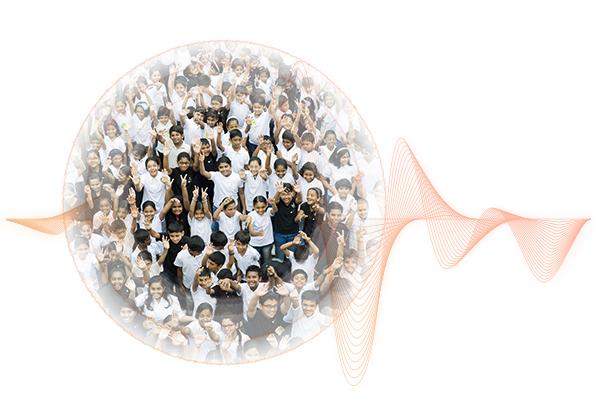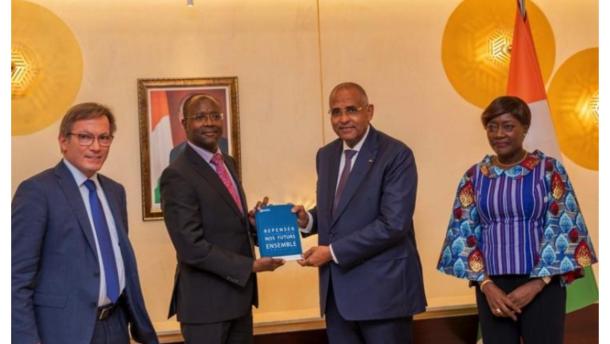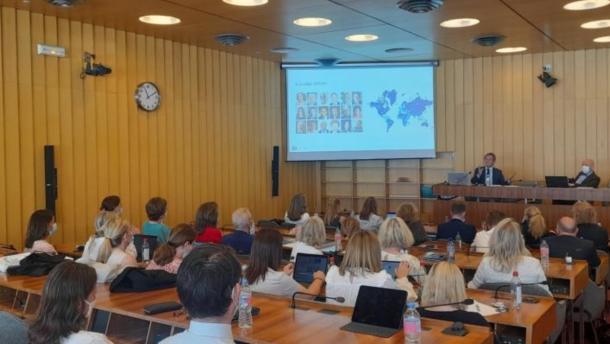
National & local dialogues

Catalonia
Reimagining our futures together: a new social contract for education, was plaunched in Barcelona on 21 March 2022 at an event organized by CATESCO at the Pedrera building, a UNESCO World Heritage site.
The event was attended by a diverse group of stakeholders, including two hundred school principals and teachers, members of civil society organizations, and representatives from several parliamentarian groups. During the event, two teachers under 30 and two school students spoke about their dream of education for the future, and the Catalan Minister of Education outlined the new competency-based curriculum being implemented in Catalonia's school system in line with the Report’s recommendations. Sobhi Tawil, Director of the Future of Learning and Innovation division at UNESCO, met with members of the Catalan Parliament to explain the Commission's report and to hear about a parliamentary initiative inspired by the report focusing on long-term educational policies.

Chile
On 11 August 2022, the Regional Bureau for Education in Latin America and the Caribbean (OREALC/UNESCO Santiago) presented in Santiago the Spanish-language translation of UNESCO's report Reimagining our futures together: a new social contract for education. Speakers highlighted the report's call for a new social contract for education to redress injustices and eliminate the multiple divides while transforming the future. They also discussed ways to disseminate this call for collective action in Chile. The report was launched at the Casa Central of the University of Chile with the participation of the Minister of Education, Marco Antonio Ávila; the rector of the University of Chile, Rosa Devés; the acting director of UNESCO's Regional Bureau for Education in Latin America and the Caribbean, Valtencir Mendes; the director of the SM Foundation in Chile, Rafael Gómez; and the executive director of Elige Educar, Joaquín Walker, among others.
The Spanish version of the report was published thanks to the cooperation with the SM Foundation.
The invitation of this valuable UNESCO report to reimagine education inspires us as a government... We must recognise the importance of the transformative role of education professionals; it is essential to cultivate inclusive, safe and healthy educational communities; we must ensure equity of access to knowledge and digital equipment; and it is more necessary than ever that curricula focus on learning for global and local citizenship, addressing such central issues for the 21st century as environmental care, interculturalism, socio-emotional well-being, gender and interdisciplinarity.
"The invitation of this valuable UNESCO report to reimagine education inspires us as a government... We must recognise the importance of the transformative role of education professionals; it is essential to cultivate inclusive, safe and healthy educational communities; we must ensure equity of access to knowledge and digital equipment; and it is more necessary than ever that curricula focus on learning for global and local citizenship, addressing such central issues for the 21st century as environmental care, interculturalism, socio-emotional well-being, gender and interdisciplinarity."
Marco Antonio Ávila
Minister for Education, Chile
China
The Chinese translation of the report was launched on Tuesday 6 September at a hybrid event co-hosted by UNESCO and the Chinese National Commission for UNESCO and organized by the Chinese National Institute of Education Sciences. The hybrid launch co-hosted by the Chinese National Commission for UNESCO and the National Institute of Education Sciences, included keynote remarks by Ms. Stefania Giannini, Assistant Director-General for Education, UNESCO, as well as presentations by Dr. Sobhi Tawil, Director of the Futures of Learning and Innovation, UNESCO, and by Professor Justin Yifu Lin, member of the International Commission on the Futures of Education. Under the theme of Reimagining the Futures of Education Together: Global Agenda and China's Contribution, the launch brought together leading experts and representatives from academia, government, and civil society organizations to reimagine education for just and sustainable futures and discuss how to best respond to the international call issued by the UN Secretary General for transforming education.
The report of the International Commission on the Futures of Education, Reimagining our Futures Together: A new social contract for education, ranked first among the top 100 books liked by Chinese teachers in 2022. This booklist published by national education newspaper China Education Daily was selected by a group of scholars and teachers who positioned UNESCO’s report on the Futures of Education as the most influential educational reading recommendation in China.
Côte d’Ivoire
As part of UNESCO support to the National Forum on Education and Literacy currently underway in Cote d’Ivoire, the report of the International Commission for the Futures of Education was presented (9 and 10 February 2022) to HE Prime Minister Patrick Achi, HE Minister of Education and of Literacy Mariatou Kone, the senior management of the minister of education, the chairs of the thematic education commissions, as well as national and international development partners. The vision and principles outlined in the Futures of Education report resonated with the main findings of the comparative analysis of educational development in Burkina Faso, Ghana, Malaysia, South Korea, and Vietnam which was also presented to the government and its partners. Both the comparative study and the Futures of education report recall that while sufficient financial resources are required for inclusive and equitable educational development, strong political will and broader societal engagement are key factors. Both the comparative study and the Futures report also highlight the importance of revaluing the teaching profession and of protecting and strengthening schools as the foundations for broader educational ecosystems.

Haiti
Between September and December 2020, the UNESCO office in Port-au-Prince, Haiti, held a series of webinars to encourage exchange and reflection on the issue of education in the context of COVID-19. UNESCO has now published a report entitled “Penser l’avenir de l’éducation en contexte de pandémie”, available only in French, which summarizes the outcome of these webinars.
Organized within the framework of UNESCO's Futures of Education initiative, this series of webinars sought to give voice to stakeholders from all walks of life in Haiti, including current and former government figures, teachers, trade unionists, university researchers, schoolchildren, students and professionals from various backgrounds. Contributors discussed the future of education from different perspectives, touching on subjects including the quality of teaching and learning in Haitian schools, literacy and non-formal education, cultural and artistic education, inclusive learning, as well as higher education and scientific research. The report outlines the substance of each discussion, and in its concluding section stresses the importance of placing humanism and diversity at the core of the Haitian education system to guarantee genuine inclusivity and ensure a better future for Haiti.
Italy
The Italian Journal Quaderni di pedagogia della scuola has released two issues devoted to reflections on the future of schools in Italy, taking as a key reference point the 2021 UNESCO report on the International Commission on the Futures of Education, Reimagining our Futures Together: A new social contract for education.
- The first issue dedicated to the theme "School: Laboratory of the Future" brings together reflections from experts and scholars on the challenges facing education today and in the future.
- The second issue presents additional analyses and experiences of pedagogical and school innovation.
Kuwait
On Thursday 4 August 2022, Mr Abdelbasset Ben Hassen, member of the International Commission on the Futures of Education and President of the Arab Institute for Human Rights, presented UNESCO's report Reimagining our futures together: a new social contract for education at a National Consultation workshop in Kuwait which was organized within the framework of September's Transforming Education Summit (TES).
Latvia
On Wednesday, May 25 2022, the UNESCO Futures of Education report Reimagining Our Futures Together: A New Social Contract for Education was launched in Latvia. The event was organized by the Latvian National Commission for UNESCO in cooperation with the Ministry of Education and Science and the University of Latvia.
In the opening remarks H.E. Anita Muižniece, Latvia’s Minister for Education and Science expressed deep appreciation for UNESCO’s contribution to shaping the future of education and driving sustainable change by promoting an open and strategic dialogue on what has to change in education. It is through this dialogue that the formula for the future of education should be sought to ensure a balance between the skills and competences necessary to a technologically advanced society, and this society’s need for empathy and emotional intelligence. Being a Member of the SDG4-Education 2030 High-level Steering Committee, the Minister stressed the importance of UNESCO's report as the intellectual foundation of the United Nations Transforming Education Summit in preparation for which Latvia takes an active role.
The report was presented by Mr Sobhi Tawil, UNESCO Director for the Future of Learning and Innovation. The event was attended by H.E. President Vaira Vīķe-Freiberga, Member of the International Commission for the Futures of Education, Prof. Indriķis Muižnieks, Rector of the University of Latvia, as well as the representatives of the academic sector and education stakeholders in Latvia.
A recording of the event is available here.

Mongolia
On 10 October 2022, UNESCO launched the Mongolian translation of its report Reimagining our futures together: a new social contract for education at an event in Mongolia jointly organised with the Mongolian National Commission for UNESCO.
Over 70 participants representing 36 government and non-government organizations attended the event, sharing their views in a series of discussions on the future of education. In addition to these in-person participants, over 60 education stakeholders participated, including participants from other government organizations affiliated to the Ministry of Education and Science, state-owned and private universities, civil society organizations, the academy of science, as well as non-governmental and voluntary organizations.
The opening remarks were made by His Excellency Mr Enkh-Amgalan Luvsantseren, Minister of Education and Science of Mongolia, Professor Shahbaz Khan, Director of the UNESCO Beijing office, and Ms Undram Chinbat, Member of the State Great Khural. Following the opening speeches, the moderator Mr. Boldsaikhan Sambuu, Secretary General of Mongolian National Commission for UNESCO, presented the first copies of the report to the guests.
Norway
On 8-9 February 2023, the Oslo Municipality and the Permanent Delegation of Norway to UNESCO, convened a group of 220 Head Teachers and School Leaders at the Oslo School Leaders Conference to further enrich ongoing dialogues on the report from the International Commission on the Futures of Education, and its implications for educational renewal in Norway. Members of UNESCO’s Futures of Learning and Innovation Division engaged in dialogue and engagements with various stakeholders —policy makers, head teachers, school leaders, and students. These discussions helped illuminate how ideas and recommendations from the Reimagining our Futures Together report are being put into practice in the Norwegian context.

Philippines
On 28 August 2020, the Philippine Futures Thinking Society (PhilFutures), in cooperation with the Philippine National Commission for UNESCO (PH NatCom), Northwestern University, Center for Engaged Foresight, Philippine Society for Public Administration, Millennium Project, DAP Graduate School of Public and Development Management, officially launched the kick-off session of the online series of futures literacy and anticipatory conversations entitled, "Futures of Education: Learning to Become.”
This interagency collaboration was conceptualized to support UNESCO's global call to rethink the futures of education and to provide a platform for 'polylogue' among experts, thought leaders, young people, educators, civil society, governments, businesses, and other stakeholders.
A recording of the webinar is available here.
Slovenia
On 22 November 2023, Slovenia held a national-level dialogue on the futures of education, particularly higher education, informed by the report of the International Commission on the Futures of Education.
The Vice-Rector of the University of Ljubljana, Ksenija Vidmar Horvat, underscored the multiple challenges that universities have faced in the past ten years. She explained that the purpose of the meeting was to reflect on the future of the university and education, and to construct a new social contract. “It is up to us today to try to set the first frameworks and starting points for further discussion,” she emphasized.

Tunisia
In December 2022, UNESCO received a written commitment on Tunisia’s efforts to forge a new social contract for education, in response to the Reimagining our Futures Together report released in November 2021.
This initiative has involved a wide range of constituencies, including the Tunisian Ministry of Education, the Arab Institute for Human Rights – chaired by Mr Abdelbasset Ben Hassen, a member of the International Commission on the Futures of Education –, the Tunisian General Labor Union, civil society organizations, students and youth movements, and various other international organizations – UNFPA, UNHCR, and UNICEF.
The seven-page document entitled New Social Contract for Education in Tunisia in light of the Report of the International Commission on the Futures of Education builds on the outcomes of two conferences:
- A first conference on the Futures of Education in Tunisia was held on 21st December 2021, just a month after the launch of the UNESCO report, Reimagining our Futures Together: A new social contract for education. It is at this conference that the idea of forging a new social contract for education in Tunisia first emerged.
- The annual conference on the Futures of Education in Arab Countries – Policies, Approaches, and Work Decisions – followed on 13–14 May 2022. The event was organized by the Arab Institute for Human Rights, in partnership with UNESCO and a number of Arab and Tunisian civil society organizations.
The inclusive dynamic created by these conferences have helped shape a shared vision and roadmap for the renewal of education and knowledge systems in Tunisia. While it is still a work in progress, the New Social Contract for Education in Tunisia report fleshes out common ambitions, key strategic objectives, and concrete commitments for the transformation of education in Tunisia.
Even more encouraging in this ‘new social contract’ is the commitment to govern education as a common good, according to principles of equity, cooperation, solidarity, and collective responsibility. Some of the overarching goals articulated in the document are by and large inspired from the Futures of Education report. For instance, the Tunisian report expressed commitments to “ensuring that teaching is no longer an individual practice and that it is rather a collaborative profession”. The document also called for the relinquishment of indoctrination-based education to give greater prominence to critical thinking, creativity, interactivity, and problem-solving based on dialogue and discussion.

